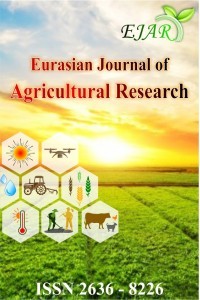The Perception Analysis of Forest Products Certification in the Wood and Wood Products Sector in Turkey
The Perception Analysis of Forest Products Certification in the Wood and Wood Products Sector in Turkey
___
- Bozlağan R. 2005. Historical Background of the Sustainable Development Thought, Journal of Social Political Conferences, 50th Book, 1011-1028.
- Büyükkeklik A., Toksarı M. & Bülbül H. 2010. A Research on Environmental Sensitivity and Innovation, Süleyman Demirel University Journal of Faculty of Economics and Administrative Sciences, 15(3), 373-393.
- Durusoy İ. 2002. Certification and Assessment of Potential Bottlenecks and Opportunities to be Encountered in the Process of Possibility, Implementation and Application in Turkey Forestry, Master Thesis, KTÜ Institute of Science and Technology, Trabzon, Turkey.
- Durusoy İ., Türker M. F. & Başkent E. Z. 2003. Forest Certification: Turkish Forestry Sector Perspective, XII World Forestry Congress, Congress Proceedings, A- Forests For People, Quebec City, Canada.
- FSC, 2016. Forest Stewardship Council website. http://info.fsc.org/index.php#result. (accessed 11 April 2016)
- Hansen E. 1997. Forest Certification and its Role in Marketing Strategy, Forest Product Journal, 47(3), 15-24.
- Koomson T. A. 2000. Implications of International Timber Certification for Ghanaian Timber Exports and Sustainable Forest Management, Ph.D. Thesis, Fletcher School of Law and Diplomacy (Tufts University), Massachusetts, United States.
- Marx A. 2010. Forest Certification as a Global Environmental Governance Tool: What is the Macro-Effectiveness of the Forest Stewardship Council?, Regulation & Governance Journal, 4(2010), 408-434.
- Murray B. C. & Abt R. C. 2001. Estimating Price Compensation Requirements for Eco- Certified, Ecological Economics, 36 (2001), 149-163.
- Owari T., Juslin H., Rummukainen A. & Yoshimura T. 2006. Strategies, Functions and Benefits of Forest Certification in Wood Products Marketing: Perspectives of Finnish Suppliers, Forest Policy and Economics, 9(2006), 380-391.
- Özdamar K. 2013. Modern Scientific Research Methods, 1nd ed., Kaan Bookstore, Eskisehir, Turkey.
- Özmehmet E. 2012. Sustainable Development Approaches in the World and Turkey, Yaşar University Journal, 3(12), 1853-1876. PEFC, 2016. The Program for the Endorsement of Forest Certification website. http://register.pefc.cz/search2.asp. (accessed 11 April 2016)
- SGK, 2015. Social Security Institution. Monthly Statistical Bulletins. Insured Statistics Month 2013. http://www.sgk.gov.tr/wps/portal/tr/company/statistics/aylik_ statistik_ information. (accessed 10 December 2015)
- Tavşancıl E. 2014. Attitude Measurement and Data Analysis with SPSS. 5th Edition, Nobel Publications, Ankara, Turkey.
- TOBB, 2012. Turkish Forest Products Council Sector Report, TOBB Publication No: 2012/172, Ankara, Turkey.
- Tuppura A., Puumalainen K. & Toppinen A. 2015. Forest Certification and ISO 14001: Current State and Motivation in Forest Companies, Business Strategy and the Environment, (2015), 355-368.
- Türker M. F., Öztürk A. & Pak M. 2001. Investigation of the Concept of Externality in Terms of Forest Resources and Forest Management in Turkey, I. National Forestry Congress, Turkish Forestry Society Publication, Congress Series No: 1, pp. 154-170.
- Türkoğlu T. & Tolunay A. 2013. Opinions of Turkish Forest Products Importer Businesses on Certified Forest Products, SDU Faculty of Forestry Journal, 14, 95-101.
- Trishkin M., Lopatin E. & Karjalainen T. 2014. Assessment of Motivation and Attitudes of Forest Industry Companies Toward Forest Certification in Northwestern Russia, Scandinavian Journal of Forest Research, 29(3), 283- 293.
- UNECE/FAO, 2015. Forest Products Annual Market Review 2014-2015. United Nations Publications, http://dx.doi.org/10.18356/4f5cd0dd-en. (accessed 22 December 2015)
- Urungu A. 2010. Sustainable Development: Action Area of Applied Anthropology, Journal of Anthropology, 24, 133-164.
- Varangis P. N., Crossley R. & Primo Braga C. A. 1995. Is there a Commercial Case for Tropical Timber Certification?, The World Bank, International Economics Department, Commodity Pollicy and Analysis Unit, Policy Research Working Paper 1479, Washington, USA.
- ISSN: 2636-8226
- Yayın Aralığı: Yılda 2 Sayı
- Başlangıç: 2017
- Yayıncı: Muhammed Cüneyt BAĞDATLI
Tissue Culture Applications in Lettuce (Lactuca sativa L.)
Şule SARIÇAM, K. Yaprak KANTOĞLU, Ş. Şebnem ELLİALTIOĞLU
Şule SARIÇAM, K. Yaprak KANTOĞLU, Ş. Şebnem ELLİALTIOĞLU
Molecular Identification, Virulens and Genetic Diversity of Fusarium species on Wheat
Filiz ÜNAL, F. Sara DOLAR, Nasibe TEKİNER, Nergiz Zeynep YEĞİN
Sustaining Vetiver grass Handicrafts: An Innovative Focus on Rural Area and Tourism
Yasemin CINDIK AKINCI, Öner DEMİREL
Comparison of Some Chemical Properties of Amik, Gavur and Golbasi Lakes Soil’s
Ahu Alev ABACI BAYAN, Kadir YILMAZ
The Analysis of Problems in the Certification Application in State Forestry Administration in Turkey
Evaluation of the Göreme Historical National Park in Terms of Tourism Practices
